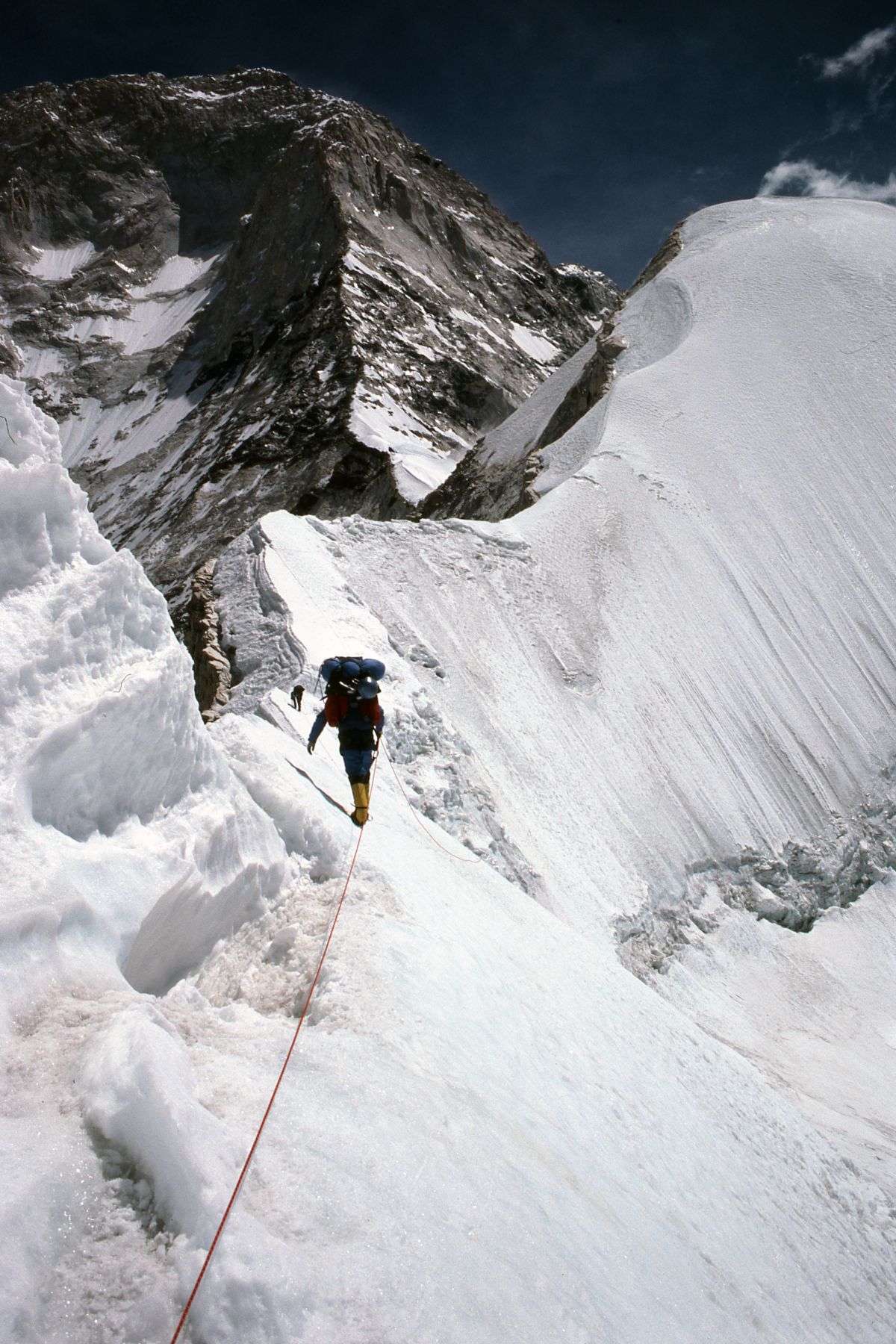New book ‘Into Thin Hair’ a memoir from a Spokane mountaineer, called ‘the most underrated American mountaineer’

Early on in Chris Kopczynski’s newly published memoir, the Spokane native and renowned alpinist recounts a story about one of his early climbing mentors.
Joe Collins was a Spokane mountaineer, 42-year employee of Teneff Jewelry, weekend warrior and early mentor to Kopcynski and John Roskelley.
“He did it within his means,” Kopczynski writes. “He had an impressive climbing resume – more than 400 peaks in 22 years – focused mostly on summits in the West and the Canadian Rockies that he could reach in a tortuous weekend of climbing and all-night driving. Joe never missed a day of work and didn’t waste time dreaming beyond his budget. He was never going to the Himalayas.”
While Collins never did climb in the world’s largest mountains, his acolytes did.
Kopczynski and Roskelley formed a legendary climbing duo, becoming the first Americans to climb the Eiger’s intimidating North Face and leading an all-Spokane climbing expedition to Makalu in 1980, an achievement recognized by the American Alpine Club as one of the 10 most significant climbs of the past century.
They carried with them some of that blue-collar ethic instilled in them by Collins and others.
While Roskelley went on to make a full-time career of climbing, finding sponsorships, fame (at least relative to the climbing world) and money speaking and writing, Kopczynski worked in construction between mountain sojourns, speaking little and writing less.
That’s partly why his memoir, “Into Thin Hair,” is an interesting and informative read. It’s a mix of memoir, history, geology and philosophical musing.
“If I were asked who I thought was the most underrated American mountaineer, I would not hesitate to say Chris Kopczynski,” Roskelley writes in the book’s forward. “His summits and attempts that fill this book speak for themselves. But there is so much more to this man’s personality I never knew.”
The book starts with a chilling description of the death zone, anything that’s higher than 17,000 feet. At those elevations, the human body begins to break down, literally eating itself in an effort to survive.
And yet, Kopczynksi writes that he was drawn to that wild and dangerous aerie. Few even knew when he climbed to these heights and even fewer understood the mental and physical risks.
“None of that mattered because if I were merely seeking recognition, I’d have chosen the surer, safer route of running naked across the field during a Seattle Seahawks game,” he writes. “We were deep into The Death Zone, yet I’ve never felt more alive.”
It then goes back in time, detailing his great-great-grandfather’s departure from Poland and the Kopczynski clans eventual migration to Cottonwood, Idaho.
Chris Kopczynksi, born in 1948, had an adventurous boyhood in Spokane. He recounts getting into trouble and adventures in equal measure.
Some of that impetuous drive clearly carried into his teenage and adult years.
He joined the Spokane mountaineers at age 15. Kopczynksi was developing a reputation – and legal record – as a troublemaker. He’d vandalized a car and broken some windows. But in the summer of 1963, his family went on vacation to British Columbia and a life was changed.
“I will never forget the first views of a real mountain as we were driving along the southern flank of Mount Verendrye near Vermillion Crossing in Banff National Park,” he writes. “Love at first sight. I desperately wanted to climb up there to see how far I could see, what the rock was composed of how it felt.”
Soon he’d find out.
As a young mountaineer he – rather audaciously – vowed to be the first American to climb the North Face of the Eiger and climb Mount Everest.
“I always think of Chris as the quiet guy who gets things done,” Mountain Gear founder Paul Fish said. “He just has a magical sense of route-finding. Maybe it’s experience in the mountains. I would trust to follow him any route he picked.”
Of course, he succeeded, but the book is not a simple recitation of victories.
He discusses the stress of intense training schedules combined with a full-time job. He also explores the science of superhuman feats, geology, poetry and religion. But at the end of the day, it’s an ode to Kopczynski’s lifelong love and obsession: mountains and the wild beauty found there.
“For 50 years of my life, taking one step at a time, I was able to climb up and back down through about 4.7 billion years of geologic history to see and feel this astounding earth more intimately than most people could imagine,” he writes at the end of the book. “As a youngster I thought going into space would be the ultimate adventure. However, I’ve lived my dream discovering planet Earth, and what a beautiful dream it has been.”